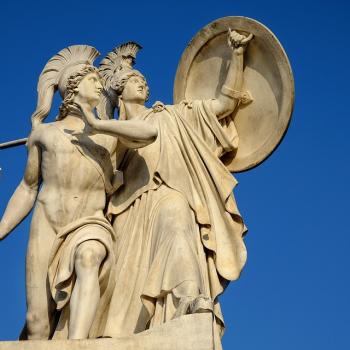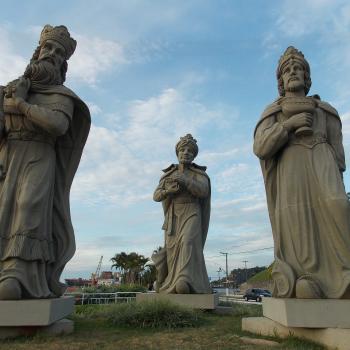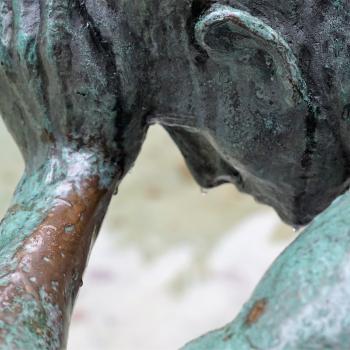 Last week I read Michael Hannon’s reflection on “Cancer and Divine Transcendence” and simply could not stop thinking about it, partly because it began with a story of suffering love and partly because it said something about God that I’m wrestling with.
Last week I read Michael Hannon’s reflection on “Cancer and Divine Transcendence” and simply could not stop thinking about it, partly because it began with a story of suffering love and partly because it said something about God that I’m wrestling with.
If I understand Hannon, he’s arguing that our empty platitudes in the face of suffering are due to a reductionist view of God that tries to explain pain as an experience either triggered or permitted by God, thus making him the responsible party at some inescapable level. Sometimes we express this belief with blame and we shake our fists at God; sometimes we express it with horror—how could you?; sometimes we express it with shame, convinced God is punishing us for something, like a sin or sheer lack of faith; sometimes we just shrug and say that God must have bigger plans and this is just a casualty of divine providence.
The label for this is “theistic personalism”—the belief that God is just a bigger, more powerful, more complex, more just, more wise, and ultimately more will-ful person on the stage of existence. Yes, we make choices and there are consequences to our choices, but when our choice and God’s choice come into conflict, God is always the Winner with a capital W. If we were to use a football analogy, God would be like a monstrously large player on the opposite team (playing both offense and defense), destined to block every play and score every point … unless he, for his own mysterious reasons, holds back and lets us score or advance the ball. Sometimes he makes us fumble. Sometimes he intercepts. And sometimes he lets us run it in.
Thus, for us to be able to make any real choices, God would have to “back off” and make room for our wills. This is a problem. If God ever were to “back off,” we would cease to exist, since it is only his will and grace that makes life—and us—possible. The doctrine of divine transcendence tells us, however, that God is not just a bigger player on the field; God is the sustaining source of the field, the players, the clock, and the game. Hannon concludes that God’s transcendence and sovereignty are of a different order, and that his providence is not in competition with our wills or even co-operative with our wills, but substantially outside, beneath, beside, and around our wills.
This does not, however, mean that our will is a figment of our imagination. This would be “causal occasionalism,” the idea that human actions have no real efficient causality, that is, they do not actually cause anything. In this kind of thinking, human actions are merely the occasions of God’s will, the operatives of his purposes. We are marionettes twitching to his tugs. Thus, again, we are left with a God who is responsible for our suffering.
Hannon’s argument is that both of these options fail to reflect traditional Christian teaching. He writes,
The import of transcendence for providence is that it reveals God’s involvement with creation to be neither interference nor interruption. God does not step into the workings of the cosmos to affect this or that—except in miraculous instances, which are the extraordinary exception—but rather is the complete cause of all that is in the cosmos at every moment. Thus in one regard, creation is radically dependent, for it can have no being apart from his creative activity at all. But in another sense, creation is radically autonomous, for within the created realm finite beings are wholly complete and, collectively, causally sufficient unto themselves.
This is transcendence, God outside of his creation, Other. A crucial Christian doctrine. This divine transcendence is what our Jewish forefathers gave us: God is not a stone or a mountain; God is not in the storm or the fire; God is not hungry; God is not local; God is not a wild and crazy, lustful and rash mannish being on Mount Olympus. God is Other. Wholly Other.
Thus far, I’ve just tried to articulate in my own words what Hannon was saying. It resonates with the way of negation, the apophaticism of Eastern Christian spirituality. God—and God’s ways, purposes, character, desires—is not merely a better version of our best imaginations, but beyond them all.
Hannon’s use of the story of Joseph to demonstrate God’s providential care, which coexisted with the evil perpetrated by Joseph’s brothers is an excellent one. God’s providence neither caused the human choices nor did it transform the human actions into something other than what they were. They were evil, and God is good.
And yet…
And yet it is not the whole picture. We believe in a God of divine transcendence who is also immanent.
Transcendent = outside, above, beyond.
Immanent = pervading, present, close at hand.
God’s providence may not make an evil thing into a good thing, but in order to bring about good purposes even through evil causes, God must be involved at an intimate, even microscopic, level. In the story of Joseph, evil plays its hand through pride, jealousy, violence, hardheartedness, lying, greed, lust, and injustice. None of that changes. But for God to “mean something for good,” he has to be present and engaged in the nitty-gritty of events as well; in Joseph’s story, we read of dreams and visions, unlikely royal favor, and odd coincidences. On the ground involvement.
We see this throughout the Old Testament: God placing a ram in the thicket just for Abraham; God revealing a gateway to heaven to Jacob; God prompting Pharaoh’s daughter to take a walk by the river one particular morning; God giving David battle plans; God making a raven bring food to a man in hiding and causing an iron axe head to float.
And then there is Jesus. All our doctrines of divine transcendence must now take into account the reality of a God who stands both outside and inside. A God who raises the dead, but not before he weeps at the graveside. A God who cannot do many miracles in one village because of a lack of faith. A God who is the very divine gift of Living Water, and yet is desperately thirsty.
Jesus is the miraculous. The ultimate intervention. In him, divine immanence is both extraordinary and ever-present. Now we can no longer strictly draw the line between transcendence and immanence. God’s very transcendence is immanent.
This conundrum must also enter into our engagement with cancer, and all the incomprehensible suffering we face. God’s will and human experiences may indeed be on completely different planes of reality, and thus equally operative, and yet…
And yet, we must cling to divine providence at the infinitesimally small level, at the unceasing points of engagement. I’m not so really sure that God’s involvement, intervention even, is the “extraordinary exception” as Hannon called it. We use the word “miraculous” when it overthrows normal expectations, corresponds to our wills, and thus fulfills our hopes, and we know such answers to prayer to be rare, all too rare. And therefore we try not to count on such things but still look for them and long for them. And that well-meaning effort to be both cynical and faithful leads to all kinds of insipid, theologically dysfunctional, and ultimately hurtful comments.
But perhaps it’s our definition of miraculous that is all wrong. We say “miracle,” and we mean God doing something we wished for that was not possible within our spectrum of knowledge. And I’m not just talking about the things we used to think were miraculous but that we understand today. Let’s leave the word “miracle” to refer to divine intervention or interruption, as Hannon uses it. How rare, really, is that? How would we know?
I have a weird history book on my shelves called What If?, a series of essays edited by Robert Cowley. All the essays are written by prominent historians who explore the curious question of counterfactual history. Counterfactuals are stories of things that didn’t happen, but that might have, with extraordinary consequences.
One small example: In 1931, Winston Churchill really was in a serious accident, nearly killed by a cab driver in New York City. After he had recovered, Frederick Lindemann, an Oxford physicist and friend of Churchill’s, told him that the force of the car’s impact was the equivalent of “two charges of buckshot fired point blank.” Even for a portly man like Churchill, two direct charges of buckshot would be lethal. In What If?, one historian, Williamson Murray, imagines the counterfactual of Churchill’s 1931 death and the subsequent surrender of Britain and ultimate Nazi victory. Returning to actual history, Murray then concludes, “The taxi injured but did not kill Churchill—a matter of inches and milliseconds saved his life. But that’s a story we already know.”
Let us say that yes, full human and natural causation were involved here—from Churchill’s mistake in not watching for traffic to the taxi driver’s speed to the snowy night conditions. But can we not say, as well, that the “inches and milliseconds,” along with the speed and the impact and the medical care were vehicles of grace and divine presence preserving Churchill’s life? Shall we call it a miracle?
Perhaps a harder question then. In that same year, 1931, Adolf Hitler was also nearly killed in an auto accident. Was that, too, a miracle? We wouldn’t like to label it so, because the counterfactual in that case—the possibility of him being killed in 1931 before he had time to kindle hell in the European arena—is what we might have wished for. In this case, the miracle would have been that he had been killed in that accident and that the human community was spared the horrors of World War 2. But, then, we would never have known it, would we? A miracle would have happened, and we would have been oblivious.
Now what do we say about divine immanence?
We sit at the hospital bedside of the one who is dying. We pray for what we desire—a miracle, an intervention, an interruption to the onrushing and certain end that we fear. And we also pray for medical wisdom, for good palliative care, for family members, for courage—things that we might normally hope for. And yes, the transcendence of divine providence—God’s will—is both enigmatic and absolute.
The story plays out. Medical efforts succeed, the illness goes into remission, and life returns. Our prayers have been granted. Or, the brokenness and illness overcome all our best medical and spiritual efforts. The beloved dies.
Either way, God reigns and the story is not over.
Amidst the grief, the confusion, the despair, the emptiness, the hunger we feel when faced with loss and suffering, God moves immanently, more near to us than the caress on a cheek or the memory of joy—in words spoken and dreams dreamed; in the strength to face a new day and the ability to sleep at night; in moments of inexplicable hope that shoot light through the gloom; in bread and wine and song and sunlight. Most definitely interrupting and intervening at every turn.
Death is still unraveling its destruction. But Resurrection has already begun; it has permeated the material world and is secretly, persistently, and victoriously working its way through everything—seen and unseen—in order to “gather up all things in Christ, things in heaven and things on earth.”
Photo by Fergus Ray Murray, Flickr C.C.












